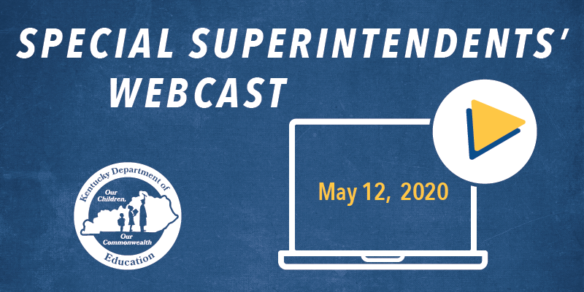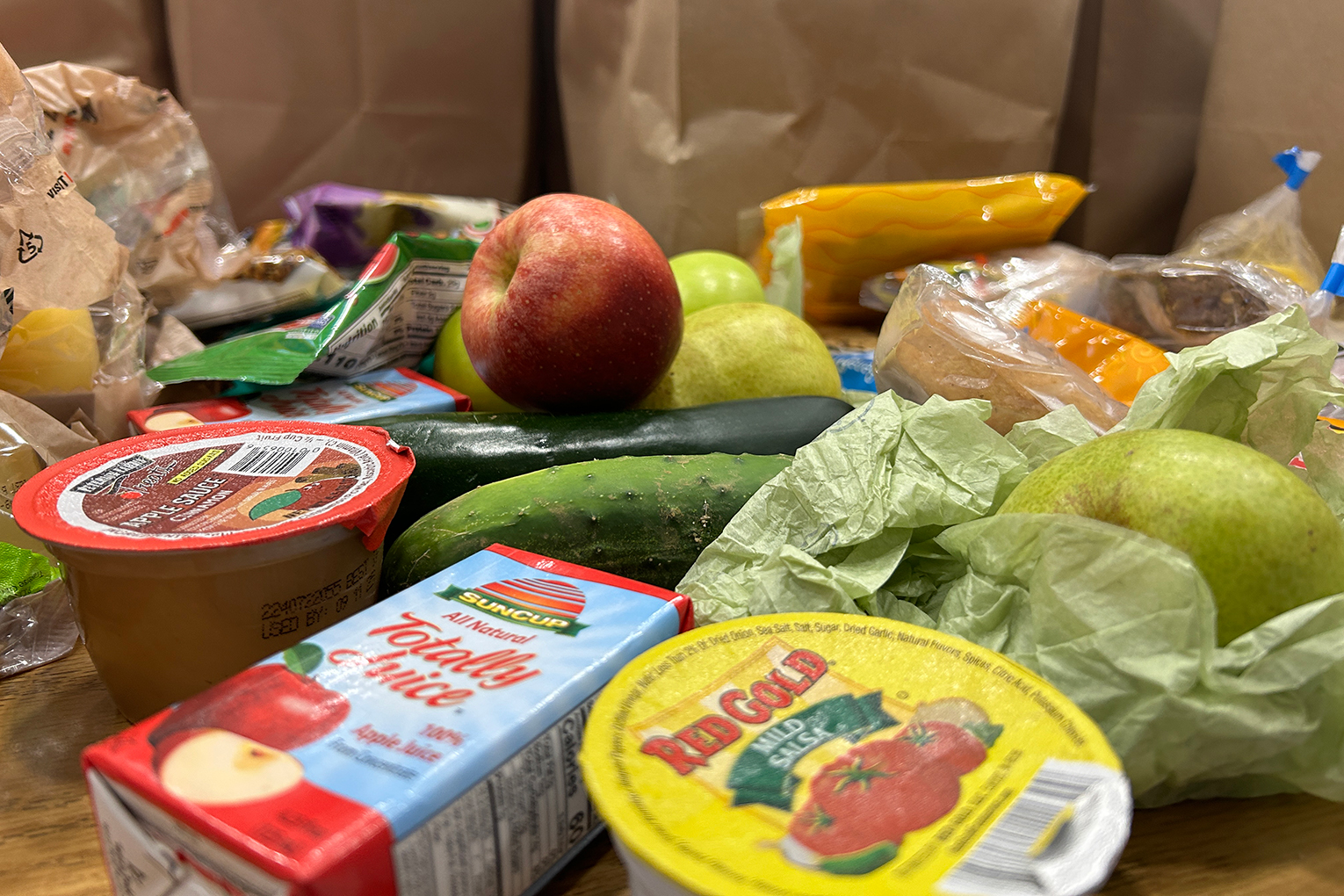
- The Kentucky Department of Education will be flexible as districts plan or adjust their school calendars for the 2020-2021 school year.
- School districts may apply for the first of the funds earmarked for elementary and secondary education in Kentucky from the federal Coronavirus Aid, Relief and Economic Security Act this week.
By Mike Marsee
mike.marsee@education.ky.gov
As Kentucky school districts attempt to plan for the start of the next school year without knowing how the COVID-19 pandemic will evolve, the Kentucky Department of Education (KDE) will provide guidance for several possibilities for reopening schools.
Interim Education Commissioner Kevin C. Brown told superintendents of the state’s 172 districts May 12 during a KDE webcast that KDE’s guidance will provide “a framework” for scenarios that districts might consider as they plan their calendars for the 2020-2021 school year.
Brown told the superintendents in the previous week’s webcast that Gov. Andy Beshear and Lt. Gov. Jacqueline Coleman want to ensure that KDE and local districts are planning for multiple scenarios that might occur before and after the start of the next school year depending on whether the number of COVID-19 cases falls, plateaus or spikes this summer and fall.
He acknowledged this week that planning could be a frustrating process because there are so many unknowns, and he said KDE will work with districts in any way possible as they formulate their plans and adjust them as necessary.
“Just know that we understand that, and the best advice for you is to plan, plan, plan and think of alternative scenarios,” Brown said. “We’re going to be here to give you as much guidance as we can and to try to flesh that out as we move through the summer.”
School calendars typically must be adopted by local boards of education by May 15 and submitted to KDE by June 30, but the department is giving districts a great deal of flexibility for their 2020-2021 calendars. The deadline for submitting next year’s school calendar to KDE has been extended to July 31, and schools that already have submitted calendars will be allowed to amend them through that date. Calendars also may be amended once the school year begins; KDE only requires the submission of a final calendar at the end of the year.
“We know this is frustrating. We know this is the time of year when you are starting to put the finishing touches on your plans for next year, and you can breathe maybe a little sign of relief with the closing of the school year and knowing your plans are made for the next, and we know you don’t have that satisfaction this year,” Brown said.
Beshear and Coleman want KDE and its districts to consider three possibilities for when the next school year might start:
- An early start, perhaps as early as late July;
- A traditional start; and
- A late start, perhaps after Labor Day.
Within each of those scenarios are two possible scenarios:
- A regular opening in which most students would return to buildings that are mostly or fully staffed; and
- An adjusted opening in which schools reopen with staff shortages or social distancing measures that will impact capacity, or with the possibility of some schools being unable to reopen.
Brown said that starting the school year earlier or later than normal is not a requirement or a recommendation. Those decisions will be made by local school boards, which must approve calendars that comply with state laws and regulations.
KDE’s guidance on school calendars is expected to be available to districts late this week or early next week, and it is expected to be updated as new information from public health officials becomes available.
“It is a living breathing document, and we expect there to be additional versions as we learn more,” said Kay Kennedy, a project manager in KDE’s Office of Finance and Operations.
The guidance is being grouped into four primary categories: district and school operations, teaching and learning, health and safety, and exceptional children.
Superintendents were encouraged to bring local public health officials and district health coordinators into the process of planning for the start of next school year, and Kennedy said KDE is working closely with state public health officials in developing its guidance.
Brown said KDE will work closely with districts to help them navigate the changing public health landscape.
“We are going to be right there along with you,” he said. “The goal is to educate all children in your district, and we realize that may look different next year than it has ever looked before. If ever there was a year for us to be creative and to think outside the box and to cut red tape, this is it.”
CARES Act funding
Districts may apply for the first of the funds earmarked for elementary and secondary education in Kentucky from the federal Coronavirus Aid, Relief and Economic Security (CARES) Act this week.
Kentucky’s K-12 schools will receive $193.2 million from the Elementary and Secondary School Emergency Relief (ESSER) Fund, which is intended to provide local education agencies with emergency funds to address the impact of COVID-19 on elementary and secondary schools, and $30 million from the Governor’s Emergency Education Relief (GEER) Fund, which is designed to enable the nation’s governors to decide how best to meet their states’ K-12 and higher education needs.
Districts may apply for their share of money from the GEER fund beginning May 15. KDE anticipates that districts will receive an amount equal to about 14% of what they received in Title I-A funds in fiscal year 2019. The governor’s office, which is administering Kentucky’s share of that fund, is asking districts to use that money in two areas: remote learning and technology, and food service delivery.
Districts are expected to be able to apply for their share of money from the ESSER fund next week.
KDE released a guidance document May 12 to support district leaders in administering GEER fund allocations; a similar document on the ESSER fund will be released later this week.
Honoring 2020 graduates
KDE is involved in two large-scale efforts to recognize graduating seniors in Kentucky high schools:
- A one-hour television show scheduled to air May 16 will celebrate the more than 3 million high school seniors across the country. Artists, athletes, musicians, commencement speakers and others will show their support with performances and messages featuring students, teachers and their families.
“Graduate Together: America Honors the Class of 2020” will air at 8 p.m. ET May 16 on ABC, CBS, Fox and NBC and will stream on multiple online platforms. KDE has produced a video message from Brown that features photographs of seniors from various schools. It will not air during the live broadcast but will be available online as part of a package of materials related to the show.
- At the state level, KDE is working to produce a 45-minute show that will feature musicians and other celebrities and will include remarks from Beshear, Coleman and Brown, as well as Rep. Regina Huff (R-Williamsburg) and Sen. Max Wise (R-Campbellsville), the chairs of the Kentucky House and Senate education committees.
KDE has collected almost 2,000 photos of seniors from schools and districts, and many of them will be used during the show.
The show will shared with local television stations and/or streamed on social media. An air/streaming date has not been set.
MORE INFO …
-
- May 12 Special Superintendents’ Webcast
- Kentucky Department for Public Health’s COVID-19 webpage
- KDE’s COVID-19 webpage
- COVID-19 Hotline (800) 722-5725




Leave A Comment